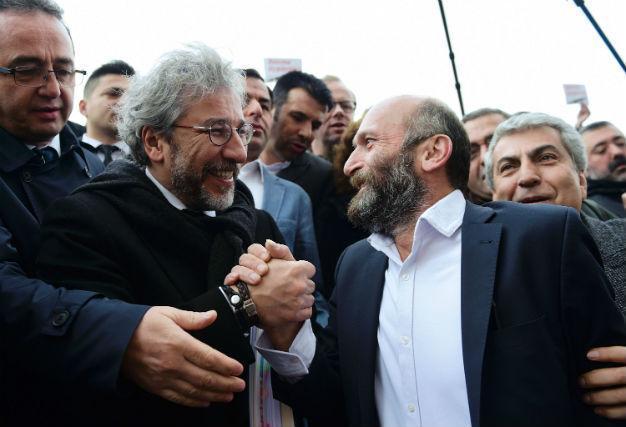Court rules for Cumhuriyet journalists Dündar, Gül to be tried in secret
ISTANBUL

AFP photo
An Istanbul court ruled on March 25 for the whole trial to be held in secret, in the controversial case of Cumhuriyet editor-in-chief Can Dündar and Ankara bureau chief Erdem Gül.The hearing was adjourned until April 1, as MPs in attendance refused to leave the courtroom after their request to follow the hearings was rejected by the judges.
The court also decided to file a criminal complaint against the lawmakers who refused to leave the courtroom for obstructing justice.
Earlier, it also accepted requests from Turkish President Recep Tayyip Erdoğan and the National Intelligence Agency (MİT) to be included as plaintiffs in the case.
A large group of supporters, including deputies from the main opposition Republican People’s Party (CHP) and the Peoples’ Democratic Party (HDP), journalists and representatives of trade bodies, had accompanied Dündar and Gül as they entered Istanbul’s Çağlayan courthouse.
“We came here today to defend journalism. We gathered here before and said the same thing. We said we would defend the people’s right to access information. We defended that and we were arrested. Then we were given pre-trial release following a Constitutional Court ruling,” Dündar said, speaking in front of the courthouse.
“We are stuck between two palaces. One of them is the unregistered palace, the other one is the court palace. The court’s palace had set us free, obeying the Constitutional Court’s decision. But the resident of the unregistered palace is trying everything to have as arrested again,” he had said ahead of the trial, in an apparent reference to President Erdoğan’s controversial presidential palace in Ankara.
Gül also vowed to “continue doing journalism.”
“Journalism is not a crime. Today, we have to defend that. It was said in the Constitutional Court ruling that what we did was just journalism. We are here to defend the law of the Constitutional Court. We did not commit a crime and we will keep on doing journalism,” he said.
The Istanbul Chief Public Prosecutor’s Office had raised eyebrows by assigning a new prosecutor to the case two days before its first hearing on March 25, after the duo’s release upon a Constitutional Court decision.
On March 23, the office assigned prosecutor Evliya Çalışkan, who was working as a prosecutor at the Terror and Organized Crimes Bureau, to the 14th Court of Serious Crimes as a trial prosecutor in the case in which Dündar and Gül are charged with espionage and terrorism.
Prosecutor Lütfi Karabacak has also been assigned to the 14th Court of Serious Crimes as the trial prosecutor of the court’s second committee, along with Judges Mehmet Çelik, Ferhat Korkmaz and Ömer Karagöl, who are a part of the judge committee. Bakırköy 2nd Peace Court Justice Bülent Dalkıran is the head judge of the committee.
Dündar and Gül, who were released pending trial on Feb. 26 after a decision by the Constitutional Court, are charged with espionage and threatening state security in stories published in Cumhuriyet about National Intelligence Agency (MİT) trucks allegedly transporting weapons to rebel groups in Syria.
The court said the journalists’ 92-day imprisonment over charges of terrorism was a “violation of rights.”
President Erdoğan and ruling Justice and Development Party (AKP) have harshly criticized the top court, which they claim “exceeded its jurisdiction.”
Erodğan said earlier that he “did not respect the Constitutional Court ruling.”
















